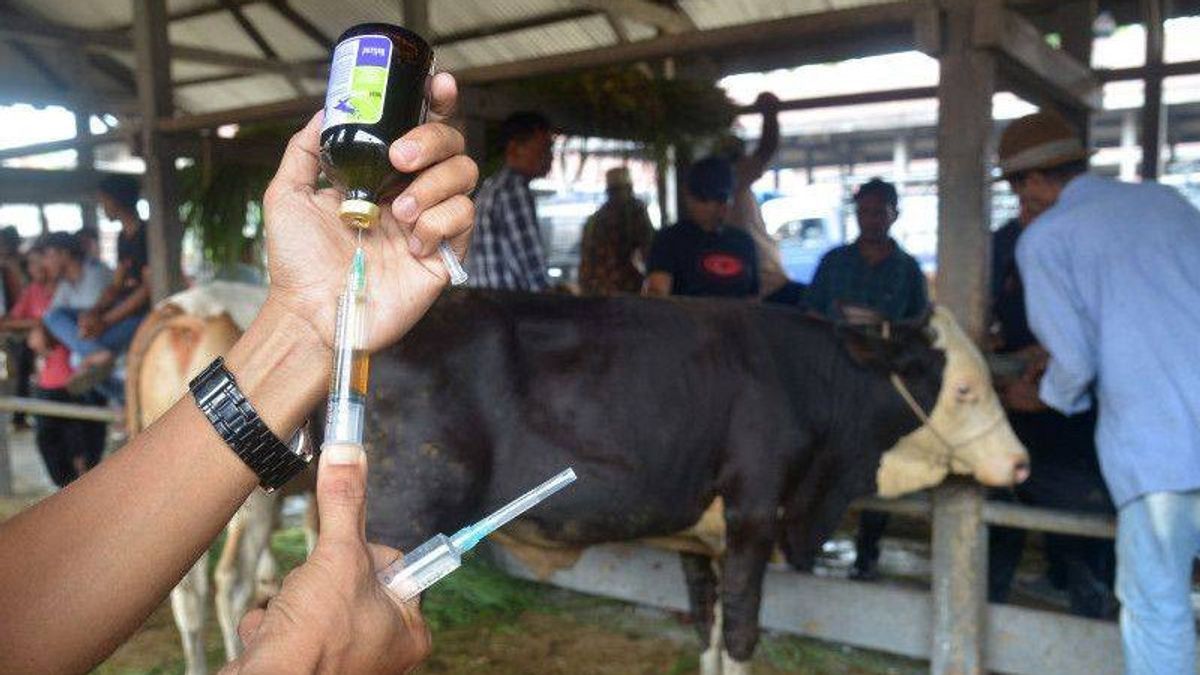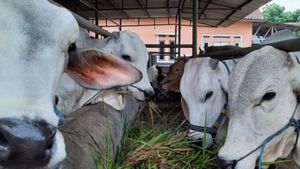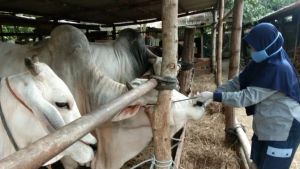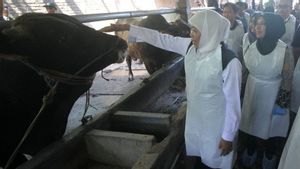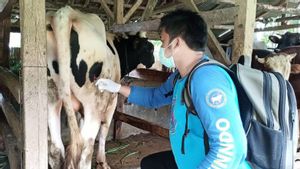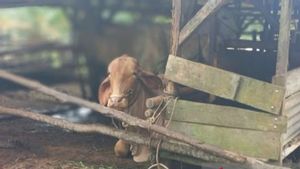BANDUNG - The West Java Food and Livestock Security Service (DKPP) has accelerated the implementation of lumpy skin disease (LSD) vaccinations in anticipation of the spread of smallpox in cattle/caves in the region. "Anticipation that has been carried out by West Java communicates, information, education (KIE) in the community and related agencies in districts/cities, and makes efforts to accelerate the implementation of LSD vaccination," said the Head of Animal Health and Veterinary Society. West Java Food and Livestock Security Service (DKPP) Supriyanto, quoted by ANTARA, Wednesday, June 14. The West Java Provincial Government has also distributed medicines and disinfectants for use in districts/cities throughout West Java. Supriyanto said the West Java Provincial Government had received 90,000 doses of LSD vaccine from the Ministry of Agriculture which had been distributed to districts/cities in West Java. For vaccinators, he said, in West Java there were 917 officers consisting of 282 veterinary medical personnel, 362 veterinary paramedics, and 273 inseminators. Supriyanto stated, to suppress LSD cases, his party has monitored livestock traffic entering the West Java region, namely by examining documents and clinical examinations by officers on livestock passing through the West Java "checkpoint". "We have also distributed vaccinations from West Java Province to districts/cities throughout West Java by guarding "Cold chains, provincial officers can deliver to districts/cities or district/city officials to take to the province," he said. The dose distributed was 74,600 out of 90,000 doses, and until now the distribution is still ongoing. Supriyanto ensured that the meat of the cattle that had been attacked by LSD was safe for consumption if the carkas and organs were normal or did not show any changes. If the carkas and meat have abnormalities, they will be made a statement and separation. If the carkas and organs from animals show systemic infection such as gland enlargement, bleeding in various organs, changing color to yellowness, the meat is not suitable for consumption and must be destroyed. "We also ask farmers to be careful when buying new livestock, they should first consult local animal health workers before crossing animals," he said. Farmers also need to maintain cleanliness around the cage, pay attention to Food intake and drinking water for livestock, as well as paying attention to livestock health. Farmers can immediately report if they find symptoms of sick livestock to local animal health workers. Supriyanto appealed to the public not to hesitate to sacrifice. According to him, choose a healthy livestock and have an Animal Health Certificate signed by a local veterinarian. For cattle, the community can choose livestock that have a national marking eartag and for goats can choose livestock that have a healthy sign. "People can carry out sacrifices in accordance with the Fatwa of the Indonesian Ulema Council Number 34 of 2023 concerning Law and Guidelines for the Implementation of Sacrificial Worship when Spreading Lumpy Skin Disease (LSD) Diseases and Anticipation of Peste Des Petits Ruminants (PPR) Diseases in Sacrificial Animals," said Supriyanto.
LSD is a disease caused by a virus that mainly attacks cattle. This disease is characterized by a lump on the cow's skin.
The virus that causes LSD is included in the genus capripoxvirus which is transmitted through anthropodes, especially blood-smoking insects (lates, mosquitoes, caplak), contaminated feed and water, as well as direct transmission through saliva, nasal secretion, and manifold water.
Supriyanto, LSD only attacks cattle and buffalo because the animal is the most susceptible species to contracting viral LSD (LSDV).
The virus has a specific receptor in the cow's body that causes the virus to enter and replicate in the body.
"Other animals may not have specific receptors needed by the virus to infect cells effectively. Cows are the main host and most susceptible to LSD, other species such as water buffalo and wild ruminance. However, goats and sheep are reported to be resistant to LSDV infection," he said.
According to Supriyanto, this disease causes lumps or spots to appear on the skin of infected animals. Starting with the spots are small and hard, but gradually grows in size and becomes soft and contains fluid.
"The roof of the spots can get red, swell, and eventually experience ulceration, which can then lead to secondary bacterial infection," said Supriyanto.
另请阅读:
Supriyanto stated that the LSD case was detected as having entered West Java.
According to him, there is one district/city Zero Reported Case (Bandung City), and nine districts/cities have active cases below 50 cases. "Five districts/cities have active cases below 50 to 100 cases, 12 districts/cities have the highest active cases," he said.
The English, Chinese, Japanese, Arabic, and French versions are automatically generated by the AI. So there may still be inaccuracies in translating, please always see Indonesian as our main language. (system supported by DigitalSiber.id)
